Disgaea D2: A Brighter Darkness Review
If you load up Disgaea D2 without knowing what you’re letting yourself in for, you might want to invest in a pair of ear plugs. Or turn the volume down, at least. I say this because one character, Flonne, has a real glass-shattering pitch to her voice. We’re talking a squeal tuned to such a piercing degree that it had an acquaintance, who was sharing the room I was playing in, raising their eyes from a book to enquire just “what the hell” I could be playing, and if it was a child’s game or not. No, it’s not a child’s game. It’s a silly game, and there’s a difference.
Flonne’s hair-raising conversational tones sort of exemplify the Disgaea spirit, you see. As obnoxious as the voice is, it works in the context of this campy, self-aware turn-based RPG. Forget Final Fantasy Tactics with all of its high-flung politics and serious-faced philosophising, Disgaea D2: A Brighter Darkness is a tale about poorly made statues created by penguin monsters and curious trans-gender activities caused by the influence of angel magic.
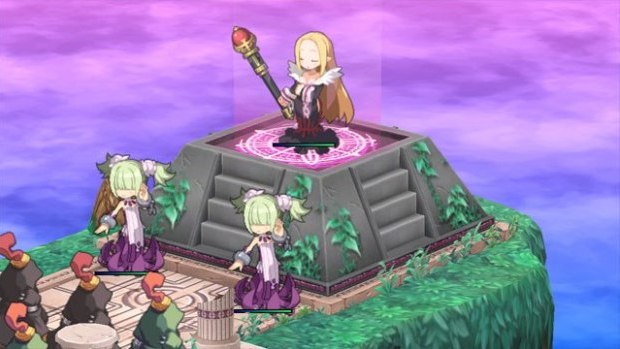
For those that follow the narrative of Disgaea, Laharl has just been crowned Overlord of the Netherworld, but no-one is taking him seriously. To this end Laharl commissions the creation of statues of his likeness (though they’re awfully designed, for the purposes of comedy) to be placed around the Netherworld. These statues soon lead to issues, however, as dissenters to his title emerge from the woodwork to contest his crown. To make matters worse, angel magic unwittingly gets in the water and compounds the escalating situation even further.
The narrative is played out of a base camp of sorts, with numerous minions hosting shops, dojos, encyclopedia and other such useful spots. This area grows as you progress and create new allies, becoming a bustling hub for your personal army. One such character takes you in to missions, and it’s in these isometric maps that you’ll see many of Disgaea’s amusing scenes (one early example involves the installation of a “water feature” into a Laharl statue) and engage in its turn based combat. And y’know what? Disgaea plays a pretty good SRPG.
The game adheres to the usual systems: you can move and attack with characters in any turn, access special moves, chomp on items and what not. Then once you’ve done everything you want to do the computer will take its own turn, advancing towards you and doing whatever it feels like.
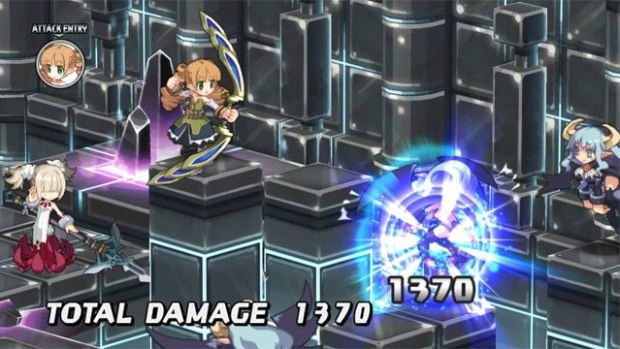
Where Disgaea D2: A Brighter Darkness impresses is in its myriad systems, some of which are completely new (monster mounting) and some which are tweaks on old ideas (throwing is more free-form than past instalments).
Disgaea D2’s success lies in the options it gives you to play the battles exactly as you want. You could just play like an average SRPG, moving units individually and using them one by one, but the game’s design encourages far more than that. Just as a basic example, moving units next to each other improves the chance of a pair attack, and also gives the units a chance to defend each other when under attack. Already that’s something extra you need to think about.
Then there’s throwing. In Disgaea D2 a character can lift another and hurl them across the stage, leaving them free to perform any unplayed actions where they land. You can even pick up someone that’s already carrying someone for some crazy chain throw action. With a bit of thought, you can always get a character where you need them. Throwing can also help you create steps from stage objects to move more effectively. Heck, if you can’t throw your character to the enemy, just throw the enemy to your character! I saved my healer a few times simply by having the medic chuck the enemy unit away from them. It’s silly, but it’s actually a smart feature when you think about it.
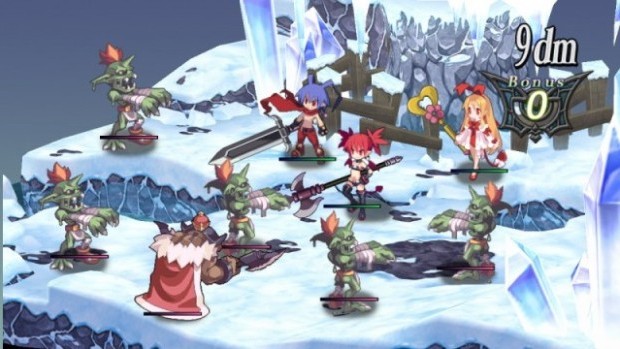
What makes things like this even better is the free-form army creation. Aside from a few key faces, you’re able to pick and choose the exact units you want backing you up from near enough the beginning, able to make more, better units as you earn more resources. This allows you to craft a fighting force to match your style, and levels let you pick and choose characters from a spawn-point during play so its systems are flexible in every area. Disgaea D2 wants you to play it however you wish.
Gameplay is deepened further when gems and coloured zones are introduced. These elements cause the battlefield to change constantly, but also add a puzzle-like layer to proceedings. Throwing a gem into a zone imbues every bit of ground of that colour with the gem’s properties, boosting or lowering stats being the simplest examples. Destroy a gem within a zone, however, and the zone, and all others of its colour, will change to that gem’s colour, but also damage everything in the zone as it does. If you manage to set every zone to one colour and destroy them you’ll earn a big damaging pay-off, assuming that enemies are in the area. Then there are character abilities that I haven’t even touched on yet, and things like weapon mastery…
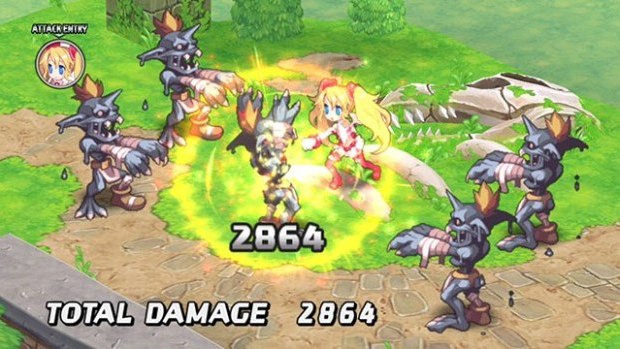
To be honest, you can play the game and ignore these extra concepts completely, just enjoying the combat at a basic level, but the one thing you can’t overlook is the big grind aspect to Disgaea D2. This is a game that attempts to parody the grind by being full of it. You’ll need to boost ally levels by replaying stages, and stages reward replays and even count how many times you’ve finished them. What’s more, shopping constantly earns rewards. Even healing: heal up at the medic in base camp regularly and you’ll earn bonuses. Disgaea D2 doesn’t care if units die; quite the opposite – it positively encourages it. The game adds a grind factor to every facet of its design, enough so that it’s almost funny. Almost. It’s still ultimately a grind though.
That said, the game is undeniably fun. The more liquid systems here create something with a bit more fizz. Disgaea D2 A Brighter Darkness is more kinetic, surprising and energetic than pretty much every other face in its genre stable. Example: while fighting a boss, the boss damaged one of my units, which another of my units took umbrage to and so attacked him back, as did another of my guys as an assist move. Then, one of the boss’ friends disliked this and attacked my unit, at which point the first unit that got attacked took offence and stabbed the minion – and all of this was triggered from the initial boss attack. The friendship system and the whole protect/support thing is just so spirited and exciting that it imbues your units with an ounce more life than those in a typical, more stilted SRPG. Throwing units the length of the field in one turn is liberating; using a strange penguin creature to ferry a martial artist is amusing.
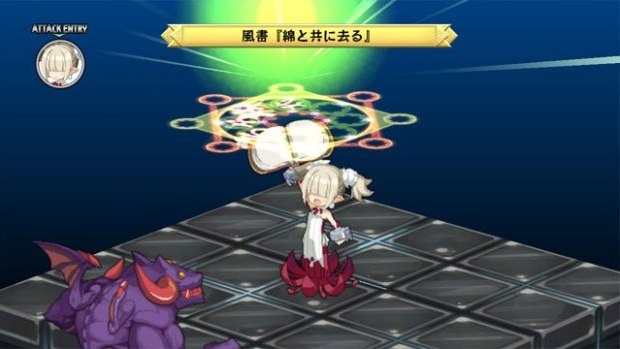
It’s true that this means the strategy present lacks the raw mathematical solidity and ferocity of, say, a Fire Emblem, but it’s hard to get hung up on that when you’re giggling at the throwaway dialogue snippets and watching a special attack that’s an homage to Bomber Man.
VERDICT: Disgaea D2 is a silly game, but it’s a surprisingly smart one, too. A little grind-y it may be, but it’s still impossible to deny that it remains entertaining in its story scenes and engaging in its combat. The loose feel of battles combines with personal army choice, a huge array of overlaying systems and a refreshingly blasé attitude to your competence to create something that’s much runnier than typical SRPG fare, but no less compelling. Disgaea D2 is the SRPG hippy next to its many Sergeant Hartman-like cousins, but sometimes you need to just chill with the more freethinking sorts, y’know? Even if some of the girls do happen to have annoying voices…

VERY GOOD. An 8/10 is only awarded to a game we consider truly worthy of your hard-earned cash. This game is only held back by a smattering of minor or middling issues and comes highly recommended.





